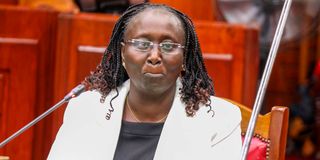'A girl has many needs': Gender CS nominee sparks fury over femicide comments

CS nominee for Gender, Culture, the Arts and Heritage, Hannah Wendot Cheptumo, appears before the National Assembly Appointments Committee at County Hall, Nairobi on Monday, April 14, 2025. Her remarks on femicide during vetting has sparked a lot of condemnation.
What you need to know:
- Hannah Wendot Cheptumo's nomination as CS for Gender faces strong opposition from 15 women's rights organisations after she suggested femicide victims were either uneducated or killed while "looking for money."
- During parliamentary vetting, she failed to address male perpetrators' responsibility, focusing instead on what women could do to avoid being harmed.
A coalition of 15 women's rights organisations has called for the immediate withdrawal of Hannah Wendot Cheptumo's nomination as Cabinet Secretary for Gender, following what they described as "troubling" and "worrying" comments about femicide victims during her parliamentary vetting.
The controversy erupted after Cheptumo suggested during Monday's vetting session that femicide victims were mainly uneducated women or educated women who were "looking for money," adding that "a girl has many needs." These remarks sparked immediate backlash from gender rights activists across the country.
"Cheptumo's words were a gross mischaracterisation of the problem and demonstrate a fundamental misunderstanding of the systemic nature of gender-based violence in Kenya," said Jedidah Maina, Executive Director at Trust for Indigenous Culture and Health (Ticah), in a press release.
"It amounts to victim-blaming, suggesting that women are responsible for their own violent deaths."
The timing of Cheptumo's nomination comes at a particularly sensitive moment, as Kenya grapples with an alarming rise in femicide cases. In 2024 alone, the country recorded 725 cases—approximately 47 women killed each week—Male responsibility
During her vetting, committee members, including National Assembly Speaker Moses Wetangula, attempted to redirect Cheptumo's focus toward preventive measures. However, activists noted that she spoke exclusively about what women could do to "avoid" being harmed or killed, while failing to address the roles and responsibilities of male perpetrators or state interventions to prevent such violence.
"Femicide is the intentional killing of women because they are women," explained Wangu Kanja, founder of the Wangu Kanja Foundation, which works to prevent sexual violence. "It is rooted in deeply entrenched patriarchal attitudes, gender inequality, and systemic failures to protect women. No woman deserves to be killed, period."
Call for action
The Coalition against Sexual Violence, which includes prominent organisations such as Oxfam, Centre for Rights Education and Awareness (Creaw), and the Independent Medico-Legal Unit, has urged the National Assembly to prioritise existing laws and policies that protect women and hold perpetrators accountable.
"We urge the National Assembly to prioritise laws and policies that protect women and hold perpetrators accountable," said Wangechi Wachira, Executive Director of Creaw.
"Dear Kenyans, women's lives are on the line. Please join us in demanding an end to femicide and all forms of gender-based violence, beginning with a strong and clear rejection of Cheptumo's nomination."
The controversy unfolds against the backdrop of an ongoing petition by Usikimye Kenya, calling on the government to legally define femicide as a distinct crime to ensure proper tracking and accountability, strengthen protective laws, guarantee thorough investigations, and increase funding for survivor support services.
As the nomination process continues, activists remain adamant that the position of Gender CS requires someone with "a deep understanding of gender-based violence and a commitment to protecting women's rights"—qualities they believe Cheptumo has failed to demonstrate.
Apology
In a social media post written after the backlash, Cheptumo apologised for her comments, saying: "I sincerely apologise for this statement. I do not hold the belief that any woman (or other human being) deserves to be killed under any circumstances."
She acknowledged that while she intended to highlight economic challenges women face, she "improperly related two separate issues." Cheptumo further affirmed that "femicide is a prevalent issue in our country and it ought to be specifically included in the Penal Code," adding that gender-based violence affects all women regardless of socio-economic status.
dmuga@ke.nationmedia.com


